Measuring our impact
Reaching a nature-positive future means planning strategically, tracking our work, and learning from our experiences.
WWF uses SMART targets (specific, measurable, achievable, realistic, and time-bound) to measure impact within a seascape.
We've developed and launched an overarching monitoring, evaluation, learning (MEL) framework that can help guide local to global monitoring across seascapes to assess progress, outcomes, and impacts of interventions on ecosystems (habitats, species, fisheries), people, prosperity, and peace. This includes the identification of performance indicators, guidance on methodologies, and mapping of data flows.
The MEL framework establishes a learning agenda, including key learning questions, audience and decision mapping, and criteria for ecological, social, and governance monitoring. We also measure and monitor our progress leveraging previously identified ecological and social baselines or creating our own with specific focus on our priority interventions.
We take the long view, designing interventions to be financially sustainable, sufficiently managed, and climate smart.
Nature-positive seascapes
Our team works to deliver nature-positive seascapes—halting the decline of marine environments and regenerating target ecosystems and marine resources.
Our place-based conservation work in seascapes takes an integrated, holistic approach that benefits local communities, global populations. We start with a science-based approach to seascape selection, design, and management. We develop specific, measurable targets within a seascape and use an overarching monitoring, evaluation, and learning framework to assess the impacts of the interventions on the planet, people, prosperity, and peace.
Through a partnership mindset, our nature-based solutions drive climate adaptation and resilience, food and livelihood security, peace and security, and healthy oceans outcomes globally.
We focus on enhancing the well-being of people and nature through inclusive, durable, and resilient systems of effective conservation areas, carefully evaluating the rights and needs of indigenous people and local communities and relying on their guidance to determine what conservation area approach is the most relevant.
To achieve financial sustainability, we partner with WWF’s Earth for Life, Enduring Earth, and other partners, to support the design and delivery of marine Project Finance for Permanence (PFP) initiatives. We will also work with public finance bodies, such as the GEF and GCF, to continue to make the case for why investing in nature-positive seascapes contributes to global nature and climate goals.
Oceans markets and finance
Our markets and finance work combines nature-positive business with innovative blue financing to deliver scalable, durable global oceans solutions, as well as support our nature-positive seascape work.
Nature-positive business supports the private sector in better addressing their environmental and social footprints, bringing forth green and blue infrastructure solutions, and establishing long-term investments in the seascapes where they do business. Our focus sectors are seafood, coastal development, marine renewables, and shipping. In the seafood sector alone, WWF has built more than 80 partnerships with companies that have made sustainable seafood purchasing commitments, touching more than 600 fisheries around the world.
On innovative blue financing, we work to influence and engage financial market actors using a strong case for action to shift capital away from harmful activities within key blue economy sectors—including fishing, aquaculture, shipping, marine renewables, and coastal development—and towards sustainable blue economy pathways, minimizing value at risk and strengthening environmental, social, and economic resilience. We will directly engage financial institutions—particularly banks, investors, and insurance companies—who strongly influence and drive systemic behavior change. We will harness our deep knowledge of solutions to influence and catalyze how venture capital and angel investors support new blue businesses that fill key market gaps and are moving in a direction compatible with a climate and nature-positive future.
Oceans futures
The nexus of oceans, geopolitical tensions, conflict, crime, and societal instability is on the rise. A robust ocean conservation agenda must therefore include natural resource conflict resolution, peacebuilding, and law enforcement capacity building. Under Oceans Futures, WWF will offer predictive analytics, early warning, and strategic planning, and preventive conservation solutions to prevent conflict over marine resources. We will also partner and support with global maritime security and enforcement organizations to build a science-driven and networked approach to unsustainable marine resource extraction.
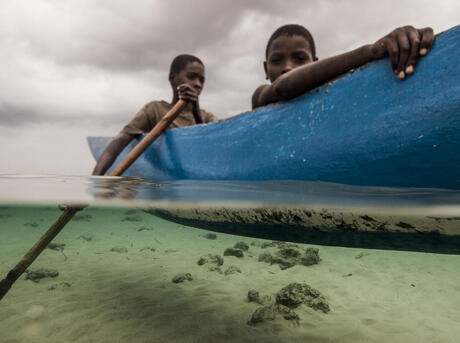
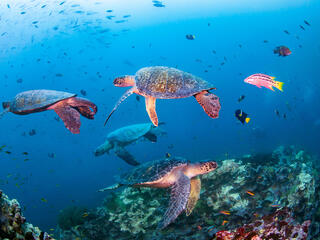
 Sustainability Works
New Coalition to Strengthen Best Practices in Seafood Sustainability
Sustainability Works
New Coalition to Strengthen Best Practices in Seafood Sustainability
 Sustainability Works
Join WWF at GreenBiz23
Sustainability Works
Join WWF at GreenBiz23
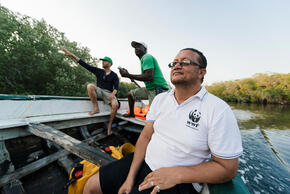
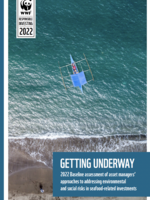
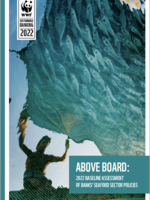
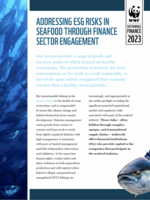
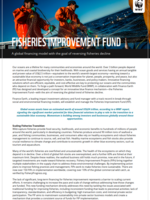
 Johan Bergenas
Senior Vice President, Oceans
Johan Bergenas
Senior Vice President, Oceans
 Sarah Glaser
Senior Director, Oceans Futures
Sarah Glaser
Senior Director, Oceans Futures
 Caroline Tippett
Vice President, Ocean Markets & Finance
Caroline Tippett
Vice President, Ocean Markets & Finance
 Steve MacLean
Managing Director, US Arctic Program
Steve MacLean
Managing Director, US Arctic Program
 Gabby Ahmadia
Vice President, Area-Based Conservation, Oceans
Gabby Ahmadia
Vice President, Area-Based Conservation, Oceans
 Alison Cross
Director, Fishery Sustainability
Alison Cross
Director, Fishery Sustainability
 Dominic Andradi-Brown
Lead Marine Conservation Scientist
Dominic Andradi-Brown
Lead Marine Conservation Scientist
 Nathan Bennett
Global Oceans Lead Scientist, Global Science
Nathan Bennett
Global Oceans Lead Scientist, Global Science